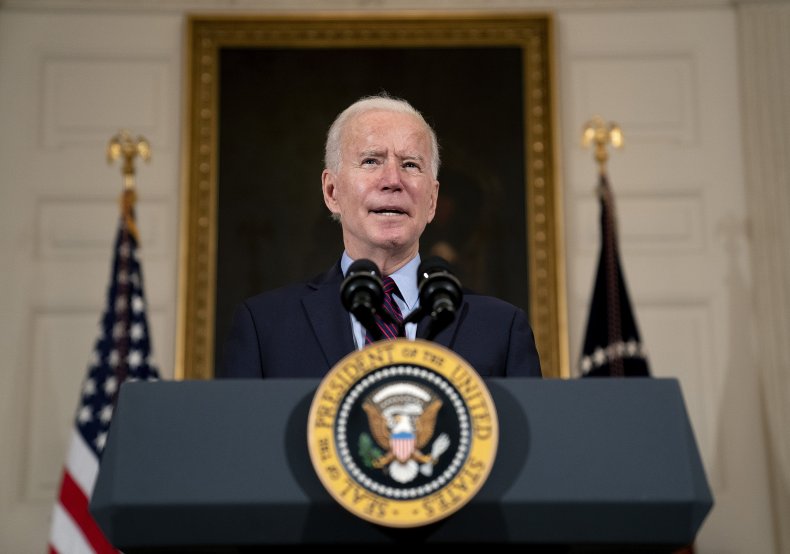[ad_1]
China is “not afraid of competing” with the U.S. under the leadership of Joe Biden, a government mouthpiece has said in response to the president’s prediction of “extreme competition” between the countries.
Biden’s remarks were made during an interview with Norah O’Donnell of CBS Evening News, which aired the segment in full on Sunday. Beijing’s retort came soon after in the form of an unsigned op-ed published by the Chinese Communist Party’s nationalistic tabloid Global Times.
The president told O’Donnell his administration would take a different approach to former President Donald Trump, on whose presidency Beijing has blamed the historic downturn in bilateral ties. In a frank warning about China’s “red lines” last week, Xi Jinping’s top diplomat had described Trump-era China policies as a “strategic mistake.”
Monday’s editorial in Global Times, which is headed by vocal editor-in-chief Hu Xijin, questioned Biden’s intention to compete with China while focusing on “international rules of the road.”
“What are international rules?” the state newspaper asked, before accusing the U.S. of neglecting rules when they are unfavorable to its interests.
“To be honest, China is not afraid of competing with others, no matter how fierce the competition might be,” it added, saying it was the “most ideal state for China’s development that all countries compete with one another in accordance to the rules.”
President Biden has yet to speak with his Chinese counterpart since his inauguration, but increasingly pointed signals have been sent the way of the White House via China’s official and unofficial channels.
Biden described Xi as “bright” and “tough” but said the Chinese leader “doesn’t have a democratic … bone in his body.” He told O’Donnell there would be “extreme competition” between Washington and Beijing amid already strained U.S.-China ties.
However, the president stressed Washington and Beijing “need not have a conflict.”
In another editorial about President Biden’s remarks, Global Times said China had “completed sending messages for cooperation” with the U.S., suggesting the onus was now on Washington to initiate talks with Beijing.
“It’s the U.S.’s turn to show its sincerity and make the next move,” the paper said, concluding: “Trump’s legacy is still haunting the U.S. Being tough on China has been somewhat a political consensus within the U.S.”
Asked why Biden had not been in direct contact with Xi, White House Press Secretary Jen Psaki said the president would first continue his consultations with allies about China.
A Biden-Xi call initiated by the White House would be seen as a significant diplomatic win for China.
Rules and norms
Under the leadership of Xi, Beijing has fielded accusations of protectionism and abuses of international conventions in its recent trade dispute with Australia, whose coal imports have been restricted, while tariffs of over 200 percent have been levied on its wines.
China claims its actions are in response to Australia’s dumping of cheap goods into the Chinese market, while observers say it is retaliation for Canberra’s siding with the U.S. in calling for an independent inquiry into the origins of the coronavirus pandemic.
Within its borders, Chinese officials have repeatedly denied widely reported examples of human rights violations against Uighur Muslims and other Turkic minorities in the northwestern region of Xinjiang. China has also quashed pro-democracy movements in the semi-autonomous city of Hong Kong by introducing a sweeping national security law and disqualifying pan-democratic lawmakers.
Other areas of concern raised by the Biden administration include Beijing’s expansionist ambitions in the South China Sea and its relentless campaign of military pressure on democratic Taiwan.
As Biden’s top diplomat, Secretary of State Antony Blinken has been among the most outspoken against Chinese policies deemed to be at odds with established norms.
On Monday, Blinken told CNN’s Wolf Blitzer that President Trump was “right to take a tougher approach to China,” despite disagreeing with the previous administration’s methods.
On Friday, the State Department released a readout from a call between Blinken and Yang Jiechi, a former Chinese ambassador to Washington and currently Beijing’s most senior diplomat.
The U.S. intended to “hold [China] accountable for its efforts to threaten stability in the Indo-Pacific, including across the Taiwan Strait, and its undermining of the rules-based international system,” said a statement about the candid conversation.
A readout published by the Chinese foreign ministry had Yang warning that Beijing would not accept any interference in its “internal affairs.”
Global Times, which espouses some of the Chinese government’s most hawkish views, suggested Beijing would rise to the competitive challenge put forward by the U.S., but only if China was allowed to take part in the rule-making process.
Faced with an increasingly bullish China, veteran Asia expert Kurt Campbell, who is serving as Biden’s Indo-Pacific coordinator, argues that hard power alone will not be enough to create regional order.
Writing in Foreign Affairs last month alongside Rush Doshi—formerly of the Brookings Institution and now a China director on Biden’s National Security Council—Campbell said the U.S. would need to play a central role in ensuring Beijing buys into a new and more balanced regional framework, one in which China can still play a primary role so long as it does not threaten its rules and norms.
Campbell called the task “among the most challenging in the recent history of American statecraft.”

Stefani Reynolds-Pool/Getty Images
[ad_2]
Source link